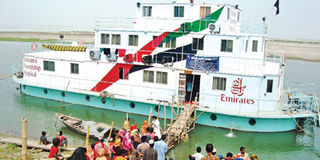A floating hospital for the poor

People stand outside one of the floating hospitals in Bangladesh
What you need to know:
Floating hospitals. In 2002, Runa Khan, founder and executive director of Friendship, a value-based organisation in Bangladesh, converted a French river barge into the first ship hospital of Bangladesh—an idea too radical even for NGOs to fund at the time. This has enabled the most impoverished in the country access healthcare.
Dhaka, Bangladesh. The way basic healthcare is provided to some of the most impoverished people in Bangladesh changed forever in the year 2002. That is when Runa Khan converted a river barge, sailed by Yves Marre from France to Bangladesh in 1994, into the first floating hospital of the country.
No one had helped these people before—they were too poor even for the NGOs. But not for Runa Khan: “I saw a mother feeding her baby in the dark. I saw a baby who had suffered burns crying for three days because they did not even have access to antipyretics like Paracetamol to ease his pain. I felt angry at the injustice of it all. I felt responsible to do something. They have the same rights as the rest of us.”
But soon she was faced with more questions than answers. Where was she to start from? These people had nothing and needed everything. What good was it to talk about rights when someone was so hungry that he could not even stand up? So she created jobs for them, built schools, ensured supply of clean water, took care of them after disasters, and gave them the most precious thing of all—dignity and hope.
Perhaps that is the difference between her and other development workers. “We work directly with the people and the donors. We do not do project to project work but work holistically with communities, ensuring they are better off than when we started,” Khan opines.
Today, her organisation, Friendship, works in the most remote and inaccessible char-islands and riverbanks of northern Bangladesh and the remote Coastal belt in the South. Armed with a fleet of three fully operational hospital ships, even performing orthopaedic and reconstructive surgeries on board, Friendship has more than 25 boats and river ambulances and has developed a threetier health care system from community based operators to secondary level interventions, with 556 Friendship Community medicsaides, 550 satellite clinics, run by a team of 22 inhouse doctors and more than 200 international volunteer medical specialists. Under the mHealth project, Friendship is also developing the first mobile-based primary health care delivery services to provide medical services at pointofcare.
Challenges
Some of the challenges she faced in the beginning still remain. Khan deliberates: “No one believed I could do this. Funding was always a challenge. Yet the most painful challenge I face daily is when I have to make a decision on who to help and who to leave behind. Do I help a young boy in need of an expensive heart surgery or do I give hundreds of people their vision back or cure women of cervical cancer?”
While the question may open a floodgate of issues in the world of ethics, Khan is not interested in all that logic chopping. “If you have empathy and compassion in your heart, you will find a way.”
The world seems to have taken notice of her sacrifice. In 2012, she received the Social Entrepreneur Award from Schwab Foundation; Women Entrepreneur Excellence Award by SCWEC 2010; IDB Award, 2008; Rolex Award, 2006; Ashoka Fellowship in 1994.
When she is not busy saving lives, Khan is an author—she has written six books on pedagogy and two children’s fairy tales. She chairs Global Dignity in Bangladesh, founded by the Crown Prince of Norway. She is also the Founder of Friendship International, operating in five countries.
Many have accused her of “spoiling the market” by providing many basic needs for free, to which Khan says: “If neither the government nor any NGO is going to help them, we will.” How to provide affordable healthcare to the poor? “The question you need to ask is how to deliver efficient healthcare services to those who so desperately need it,” Khan asserts.
Fight still on
“Healthcare and education is their universal right and it is pointless to argue if they can afford it or not. I am going to fight with all my might so that those who cannot afford it still have access to these fundamental rights.”
Khan is the kind of person who, to save someone, jumps into the fire, not run away from it.




